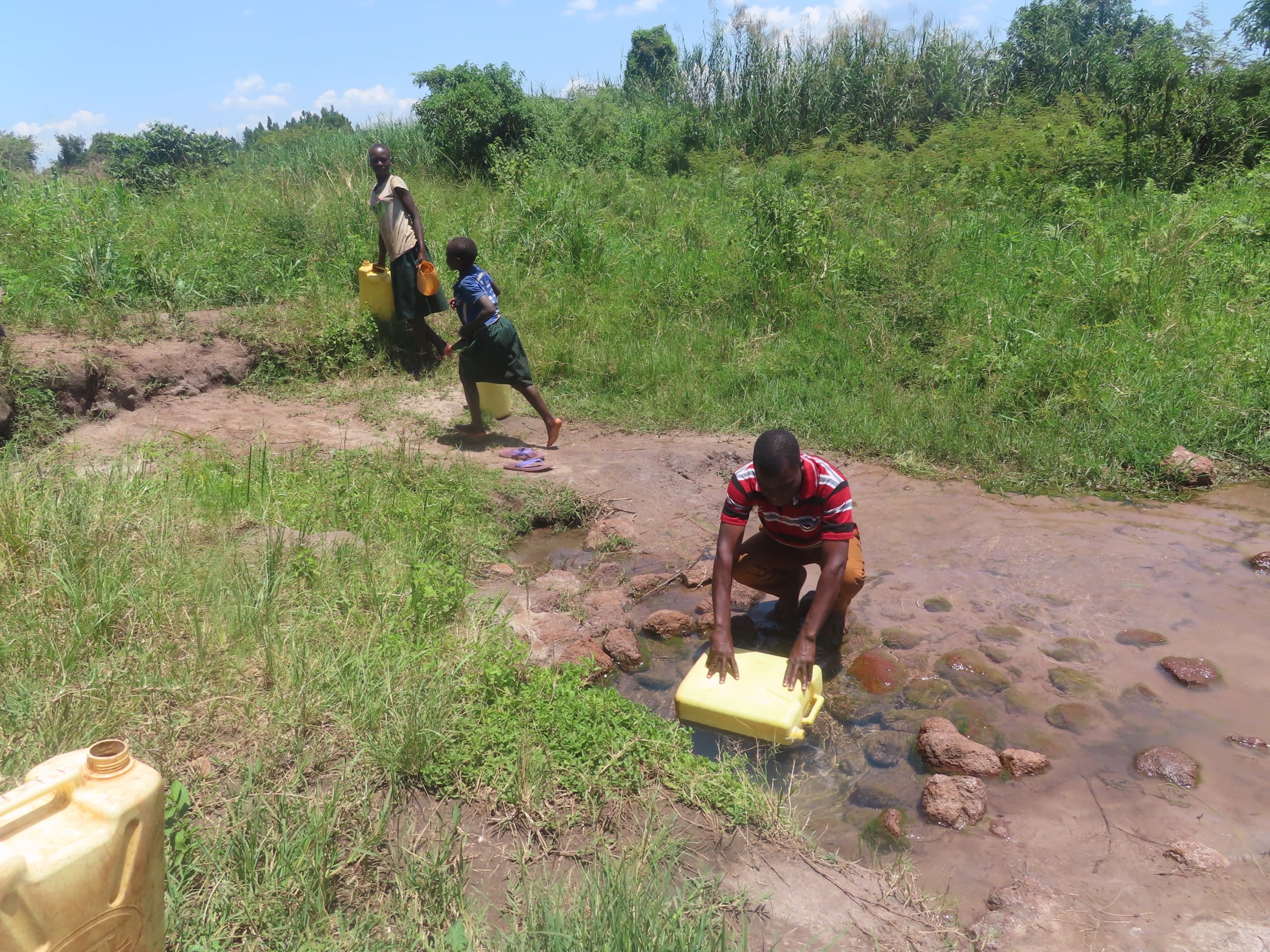The 300 people of Okweche Community struggle to access sufficient water to meet their needs. The community has two water sources, a stagnant pool of water and a borehole at the community school, but both present serious issues.
"The open hole is open to contamination. It's hard to access because the road is through people's gardens and [is] greatly affected by climatic changes," said field officer Sarah Katusiime.

"[I'm] always scared of collecting turbid water, especially when my fellow children have played in it. My mother quarrels with me, and last week my mother beat me because I brought home dirty water," said 12-year-old Prosey A., shown above collecting water at the open water source.
"[I] expect to drink water and have lunch on arrival from the garden but to find nothing due to delays at the borehole, and therefore I advised my wife to be collecting water from the nearby open hole which is close to us," said 42-year-old farmer Peter Lalobo, seen below collecting water.

"It was easy for us at initiation, but as time went on, firewood was a problem. Also, controlling the children is a bit complicated as they end up drinking any water they find, and this has triggered the rate of water diseases like diarrhea, stomach ache, and headaches."
Even with the issues, people primarily rely on this source because the alternative is so overcrowded.
"The alternative source is overcrowded due to the high population served of approximately 2,500 people plus the school," said Sarah.

Waiting hours in line to collect water causes people to neglect other crucial tasks, such as tending their gardens, thus reducing the resources available to their families. It steals education from children and consumes their good health.
Installing a new well will enable people like Peter to focus on the tasks needed to provide for their families. Children like Posey could efficiently collect safe drinking water and still have time and energy to focus on improving their daily lives. Access to clean water will hopefully restore this community's health from water-related illnesses and instill some peace in their lives.
The Proposed Solution, Determined Together...
At The Water Project, everyone has a part in conversations and solutions. We operate in transparency, believing it benefits everyone. We expect reliability from one another as well as our water solutions. Everyone involved makes this possible through hard work and dedication.
In a joint discovery process, community members determine their most advantageous water solution alongside our technical experts. Read more specifics about this solution on the What We're Building tab of this project page. Then, community members lend their support by collecting needed construction materials (sometimes for months ahead of time!), providing labor alongside our artisans, sheltering and feeding the builders, and supplying additional resources.
Water Access for Everyone
This water project is one piece in a large puzzle. In Kenya, Sierra Leone, and Uganda, we're working toward complete coverage of reliable, maintained water sources that guarantee public access now and in the future within a 30-minute round trip for each community, household, school, and health center. One day, we hope to report that this has been achieved!
Training on Health, Hygiene & More
With the community's input, we've identified topics where training will increase positive health outcomes at personal, household, and community levels. We'll coordinate with them to find the best training date. Some examples of what we train communities on are:
- Improved hygiene, health, and sanitation habits
- Safe water handling, storage & treatment
- Disease prevention and proper handwashing
- Income-generation
- Community leadership, governance, & election of a water committee
- Operation and maintenance of the water point
A Community-Wide Approach
In Uganda, we require that the community pledges to stop any open defecation practices before we install the water project — meaning that every household must construct and use a latrine. This will help prevent the spread of diseases and start them on a new path toward better hygiene and sanitation alongside their new water source.
To help with this, we assign a Community Development Officer (CDO) to each community, who encourages each household to install a handwashing facility, animal-keeping structures, a garbage pit, and a drying rack for dishes. Each of these homestead components prevent commonly spread diseases in their own way.
We implement something called a Community-Led Total Sanitation (CLTS) approach, which involves setting up multiple meetings during which community members assess their own hygiene and sanitation practices in hopes of creating long-term change. During these sessions, leaders naturally emerge and push the community to recognize current unhealthy behaviors that affect the entire community.

 Borehole Well and Hand Pump
Borehole Well and Hand Pump
 Rehabilitation Project
Rehabilitation Project












